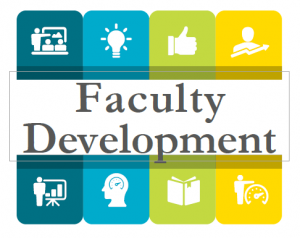Adjunct Certification Training
Please visit this link for the most current information about Faculty Development at JCCC.
Adjunct Certification Training (ACT) provides adjunct faculty with the tools and resources to assist them in becoming more effective educators in the classroom. Details on required and elective courses are available in the ACT Brochure and Schedule.
Enrollment is limited to 30 participants per semester. Certification requires completion of the nine required modules and at least one elective module within a two-semester sequence, with the option to extend for one additional year. Upon completion of ACT, the adjunct will receive a one-time stipend of $800.
Goal:
To provide tools and resources that assist adjunct faculty in becoming more effective educators
in the classroom.
Upon completion, the adjunct instructor should be:
- Cognizant of the college’s mission
- Aware of policies and procedures of the academic branch
- Comfortable in the college’s learning community
- Equipped with more resources to enhance student learning in the classroom
Requirements:
Participants complete the following requirements within a two-year period:
- All nine required modules (see below)
- Minimum of one elective module
- Updated Individual Development Plan or Professional Development Portfolio signed by your supervisor
- Reflective Journal
- Indicates what you have learned and how your teaching reflects what you have learned
- Is to be submitted electronically to Farrell Hoy Jenab at fjenab@jccc.edu
upon completion of the nine required modules and one elective module - Must be received electronically by noon on dates indicated in stipend guidelines
Stipend and recognition:
Adjunct faculty who complete the ACT program will receive a one-time stipend in the amount of $800 and will be honored at the Lieberman Awards dinner.
- Those completing all requirements by November 15 will receive stipend payment in January.
- Those completing all requirements by April 15 will receive stipend payment in May.
Notice: Participation in and completion of the Adjunct Certification Training (ACT) program is voluntary and in no way confers any rights or privileges other than those outlined regarding salary. Specifically, participation in and/or completion of the ACT program is not intended as a promise of future employment. All hiring and tenure decisions are made on a case-by-case basis and operate independently of the ACT program.
Visit this link to apply
Required Modules:
Search for available class numbers and CRN numbers (for enrollment) here.
Creating a Learner-Centered Syllabus
- This module will provide adjunct faculty with the opportunity to review the JCCC Educational Affairs Committee’s most current syllabus guidelines. A number of workable approaches that focus on creating a learner-centered syllabus will be discussed. This session is a very practical opportunity to revise your syllabus. Attendees are encouraged to bring a copy of their current syllabus to this session.
Irene Schmidt, adjunct professor, Foreign Language
Legal Issues
- This module is designed to provide adjunct faculty with a “broad stroke” understanding of a variety of legal issues that apply to their jobs. FERPA, ADA, Gramm-Leach-Bliley Act, sexual harassment and student conduct in the classroom are some of the issues that will be covered.
Paul Kyle, dean, Student Services
Online Learning Tools
- This session will focus on instructional techniques regarding how to incorporate the use of Web tools and strategies that can increase student engagement, promote critical thinking and active learning.
Paul McCourt, senior analyst, EdTech Center
Assessment and Curriculum: Understanding the Connections
- Is there something you want to understand better about your students? Do you want to find the connection between pedagogy and assessment? Would you like to develop a cycle of continuous inquiry into learning in your classroom? This session will explore the use of the Cycle of Assessment to help faculty increase student learning in the classroom.
Sheri Barrett, director, Outcomes Assessment
Microteaching and Classroom Video Recording
- This module will require two separate video- recording experiences. The first part is a microteaching activity. After registering for one of the scheduled sessions, the adjunct faculty member will present a five- to seven-minute lesson of their choice and receive feedback from their peers and the facilitator. The second part consists of video-recording one of the adjunct faculty member’s class sessions. After the session, the video-recording will be viewed one-on-one with the facilitator. Adjunct faculty will keep their own DVDs. NOTE: Each microteaching session is limited to seven participants.
Myra Young, professor, Speech
Active Learning
- This interactive, hands-on module will focus on integrating multiple learning tools into the college classroom.Basic brain research will provide the background for developing lessons that engage students and make the most of a learning situation.Join us for this fun-filled session modeling easy-to-use strategies supported by cognitive research.
Charis Sawyer, professor emeritus
Organizational Development Survival Skills for the Adjunct Certification Program
- This ACT session acquaints adjuncts with technology available to use in the classroom at JCCC, learning management systems in use at the college, technology tools for the classroom, mandatory training modules (including harassment and ADA), getting help for technical problems, resources available through the library, as well as campus safety and security systems.
Rachel Haynes, technical training coordinator, Organizational Development
Strategies to Reach Students
- In this module, participants will experience learning via the brain’s natural cycle while gaining specific strategies and behaviors that promote student participation and engagement. The objectives of this module include understanding the three factors required to build successful connections with students, creating a connected classroom climate, and gaining familiarity with activities that engage students
which, in turn, enhances learning. This session involves small group work and discussion.
Ashley Vasquez, assistant professor, Speech
Classroom Diversity Issues
- This module provides adjunct faculty with an opportunity to discuss diversity from a variety of view points, including the manner in which diversity presents opportunities and challenges in society and in the classroom. In addition, hate crimes will be discussed within the institutional context.
Diane Kappen, adjunct associate professor, Psychology
Elective Classes:
Flipping the Classroom
- Flipping the classroom occurs when the traditional instructional process occurs in an online learning environment. Face-to-face class time is devoted to active learning or problem-based learning opportunities that are associated with viewing/hearing class lectures outside of class prior to attending class. In this module, we will discuss course design and techniques associated with this teaching and learning environment.
Heather Seitz, assoc. professor, Science
Strengths-Based Classroom
- Building upon the current literature and research available through StrengthsQuest and Gallup, this module will introduce faculty members to the idea of incorporating and implementing strengths-based pedagogical techniques in their classroom. Specifically, the objective of this module is to demonstrate techniques instructors can use to help students recognize their own unique strengths in order to help guide students toward reaching their full potential.
Amy Pace, adjunct professor, English
Pedagogy and Classroom Leadership
- Crafting an effective lesson plan, establishing objectives for each class session, including appropriate application activities for content, and effectively checking student understanding are all key to a positive class experience. Learn how effective classroom management will help your students get the most out of your class.
Valerie Mann, assoc. professor, College Success
Suneetha Menon, assoc .professor, Science Resource Center
Enrollment Instructions for ACT Courses:
If you know the CRN for the course, follow these easy steps in MyJCCC.
- Log into MyJCCC. From www.jccc.edu, select Login and select MyJCCC.
- Select the Employee or Student Tabs.
- Click on the green ADD/DROP CLASSES button.
- Select the term Staff Dev 2018-2019 then click submit.
- Scroll to the bottom of the window and add the CRN in the blank box. Use one CRN per box.
- Click Submit Changes.
- After registering, you will receive an email confirmation to your @jccc.edu email address.
If you do not know the CRN and/or want to see what other courses are being offered, click here: Staff Development Open/Closed Class List
In the Keyword box, type all or part of the title of the course to see the schedule or check the Narrow Results column on the right for subject areas. After finding the CRN, see above for enrollment instructions.
For more information, contact:
Farrell Hoy Jenab at fjenab@jccc.edu or ext. 4756

